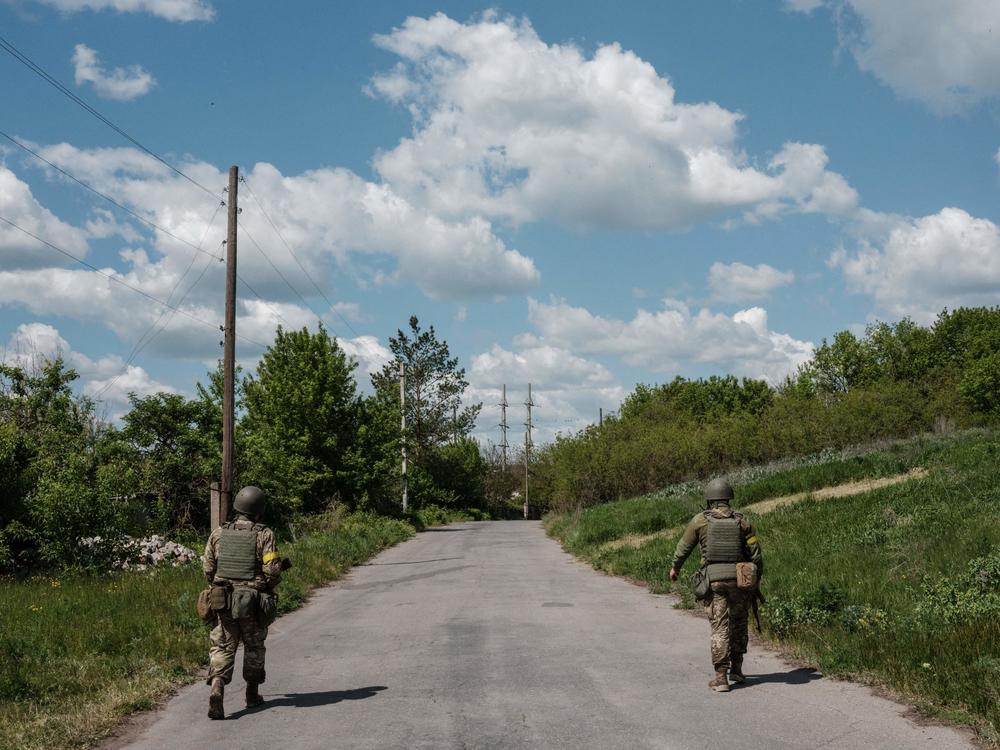Section Branding
Header Content
The U.S. is sending advanced rocket systems to Ukraine, but not to be shot into Russia
Primary Content
Updated June 1, 2022 at 10:42 AM ET
As Russia's invasion of Ukraine nears the 100-day mark, the U.S. is sending Ukraine more advanced weaponry in the hopes of strengthening its position on the battlefield and at the negotiating table.
President Joe Biden wrote in a Tuesday New York Times opinion essay that the more advanced rocket systems and munitions will enable Ukrainians to make more precision strikes on battlefield targets in their own country. He went on to outline what the U.S. will and won't do when it comes to the war in Ukraine.
The president stressed that "we are not encouraging or enabling Ukraine to strike beyond its borders," while senior administration officials separately said that Ukraine gave assurances it would not use the missiles to strike inside of Russia.
But the U.S. will — among other things — continue cooperating with allies on Russian sanctions and providing Ukraine with advanced weaponry and financial assistance, Biden added. These longer-range rockets are part of a new $700 million weapons package set to be officially announced on Wednesday.
"Americans will stay the course with the Ukrainian people because we understand that freedom is not free," he wrote. "That's what we have always done whenever the enemies of freedom seek to bully and oppress innocent people, and it is what we are doing now."
What is the U.S. sending?
The U.S. is providing Ukraine with several M142 High Mobility Artillery Rocket Systems, a senior administration official told reporters on Tuesday.
The satellite-guided systems — which the U.S. used most recently against the Islamic State in Iraq and the Taliban in Afghanistan — are based on truck chassis and extremely precise.
Their range is about 40 miles, which is roughly three times farther than the Howitzer artillery the U.S. has sent to Ukraine. Along with Western intelligence, these new rocket systems will make it possible for Ukrainians to reach critical Russian targets — such as command-and-control centers or fuel depots — and possibly slow the Russian advance, especially in eastern Ukraine.
Using the sophisticated system typically requires months of training, but the U.S. reportedly plans to shorten the training period to about a week.
What is Russia saying?
Even before Biden's announcement, Russian Foreign Minister Sergei Lavrov had warned last week that sending Ukraine weapons that could hit Russian territory would be a serious step toward escalation.
In what appears to be a response to Biden's announcement, about 1,000 members of the strategic nuclear force are conducting exercises, Russia's defense ministry said Wednesday.
Biden acknowledged the concerns about Russia's potential use of nuclear weapons, which he said "would be completely unacceptable to us as well as the rest of the world and would entail severe consequences."
"We currently see no indication that Russia has intent to use nuclear weapons in Ukraine, though Russia's occasional rhetoric to rattle the nuclear saber is itself dangerous and extremely irresponsible," he wrote.
Why announce it in a newspaper column?
It's not clear why Biden chose to share the news in an essay, but the editorial pages of The Times could provide a hint.
A recent editorial by the newspaper said that "a negotiated peace may require Ukraine to make hard decisions," indicating the country might have to give up land.
That angered Ukrainian officials. Biden's essay, with its clear assurances of U.S. support, may have been an answer to the piece.
"My principle throughout this crisis has been 'Nothing about Ukraine without Ukraine,' " he wrote. "I will not pressure the Ukrainian government — in private or public — to make any territorial concessions. It would be wrong and contrary to well-settled principles to do so."
He said the U.S. would continue to stand by Ukraine, describing that as not only the right thing to do but "in our vital national interests to ensure a peaceful and stable Europe and to make it clear that might does not make right."
Copyright 2022 NPR. To see more, visit https://www.npr.org.

